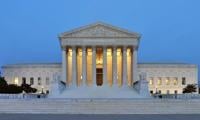
Madsen
OLYMPIA, Wash. (Legal Newsline) - For the first time, Washington courts will let workers sue their employers over asbestos exposure, as its state Supreme Court, following an influx of new Democrat-appointed justices, just disagreed with its past self.
The 7-2 decision resembles a recent Pennsylvania Supreme Court ruling that exposes employers to asbestos lawsuits despite existing workers' compensation remedies. That ruling drew a harsh dissent from Justice David Wecht, who felt the court was rewriting existing law.
Similarly, Washington justice Barbara Madsen criticized her court's majority, writing it goes against what lawmakers created in 1911 when employers were given immunity from most lawsuits in exchange from the guarantee of workers' compensation.
"In over 100 years, the legislature has not amended the deliberate injury exception," she wrote May 29. "If that exception is to be broadened, it is the legislature that should do so with public input and considered deliberation."
The case concerns asbestos exposure Jeffery Cockrum experienced while working for Howmet Aerospace, the corporate successor to Alcoa also known as Arconic.
Cockrum worked at Alcoa's Wenatchee Works aluminum facility for 30 years and claimed the company knew asbestos would harm him, yet deliberately had him work without respiratory protection.
As for Alcoa's "deliberate intent" to injure workers, an exception that allows them to sue in addition to workers' comp benefits, Justice Raquel Montoya-Lewis wrote for the majority that the company had a medical monitoring program for its employees that showed employees from at least 1953 on were coming down with asbestos-disease symptoms.
Cockrum caught one of those diseases - mesothelioma. His doctors noted his exposure history at Alcoa when diagnosing him, and experts used by his lawyers also blamed the company.
Lower courts used a 2014 ruling known as Walston to rule his lawsuit couldn't move forward. That opinion said no employee could sue for a latent disease like mesothelioma because they could never prove employers were certain exposure to asbestos would harm their workers.
That is no longer the law, thanks to the ruling in Cockrum's case. "Virtual certainty" that employees would be made sick is good enough for plaintiffs to proceed now.
"This court does not lightly set aside precedent, but justice requires us to admit our mistakes when we make them and to overrule precedent that is demonstrably incorrect and harmful," Montoya-Lewis wrote.
Five current justices were on the court in 2014 when Walston was decided by a 5-4 vote. Three from the minority - Gordon McCloud, Steven Gonzalez and Debra Stephens - voted to overturn it in Cockrum's case, as did justices Helen Whitener, Mary Yu and Montoya-Lewis.
The latter three were appointed by Democrat Gov. Jay Inslee in the years after Walston. Derek Vanderwood, a Superior Court judge sitting by assignment, also voted to overturn it.
That left only justices Charles Johnson and Madsen from the Walston majority. He joined Madsen's dissent.
She wrote Cockrum never showed Alcoa had actual knowledge that asbestos exposure would produce certain injury, so the "deliberate intent" exception to workers' comp law did not apply.
"The evidence shows that asbestos does not result in injurious disease to every exposed person," she wrote. "Asbestos-related diseases are a risk, but not certain to occur... However reluctant we may be to uphold the sometimes harsh reality of our workers' compensation system, that is the grand compromise.
"Altering that bargain is a matter for the legislature, not this court."






